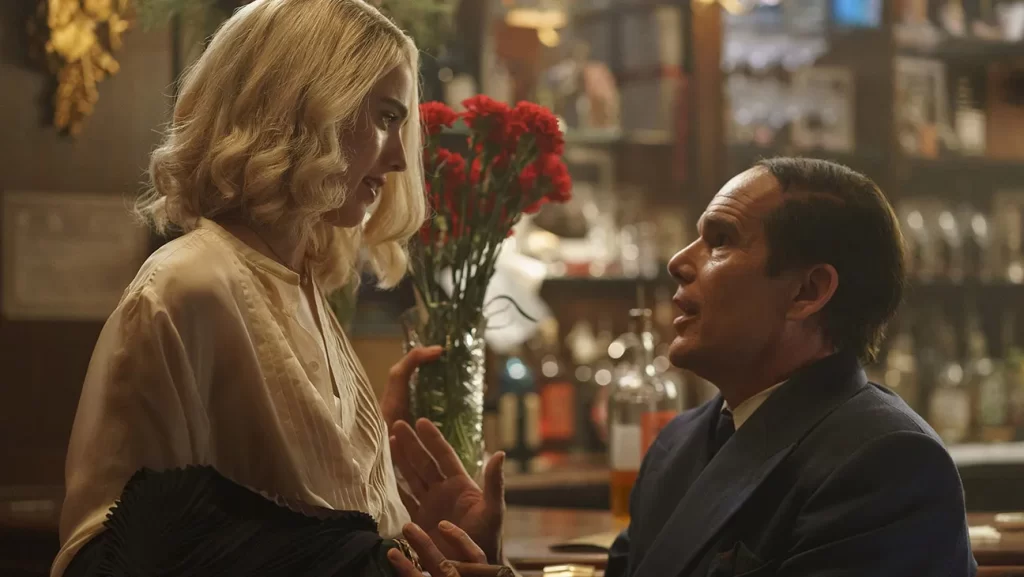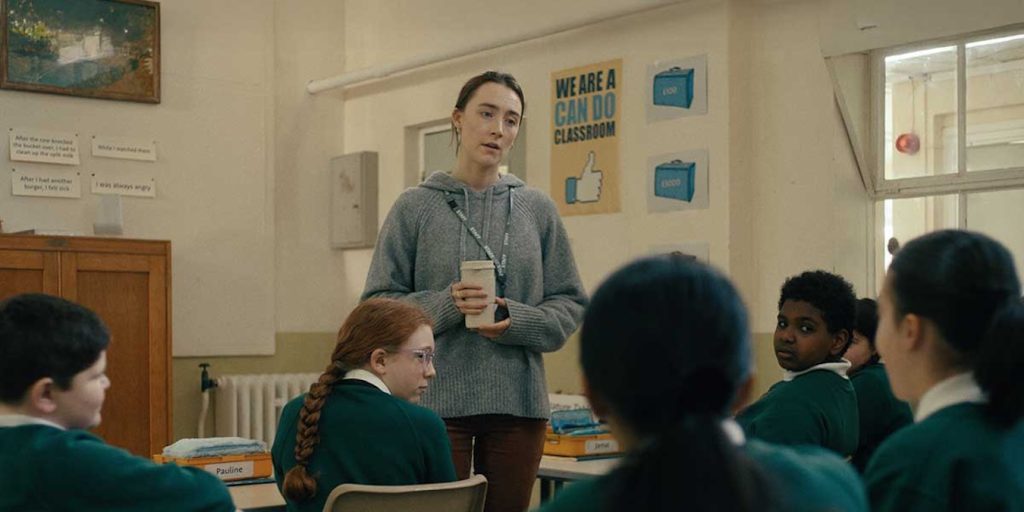We know, most of us, that our actions have consequences. (There is admittedly a segment of the population that disputes this.) It can be interesting, therefore, to see what rational people do when they have options, knowing that their choices will affect the future.
Most movies don’t explore this very much. Our heroes tend to be put in situations where, while there is nominally a decision to make, there’s only one real option (it usually boils down to “fight” or “give up”). We’re flattered into believing that what the hero does is what we, ourselves, would have done in that scenario. How much more interesting, then, when there are multiple viable choices, and when the hero makes a choice that is NOT what we, ourselves, would have done?
I thought about this during When You Finish Saving the World, an urbane comedy (written and directed by Jesse Eisenberg, which tells you about 75% of what you need to know) about a liberal do-gooder mother (Julianne Moore), her fame-seeking musician son (Finn Wolfhard), and their complete failure to relate to one another, or to anyone. These are privileged characters with many options before them. Why do they consistently choose to be self-absorbed idiots?
I say this with affection. What makes WYFSTW work so well despite its characters’ poor decision-making is that their bad choices are relatable and fascinating. Teenage Ziggy Katz has 20,000 followers on his livestream channel, a fact that he mentions no fewer than three times to Lila (Alisha Boe), the hyper-political classmate he wants to impress (who is not impressed). His mother, Evelyn, who works at a women’s shelter and has developed a mom crush on a kid staying there, manufactures an excuse to go back to the shelter one evening to mother the child (who has a perfectly good mother of his own). Ziggy and Evelyn both do this sort of thing constantly in their efforts to connect with the objects of their affections. We laugh and cringe at them, and hope we would not behave so embarrassingly, but the painfully funny part is knowing there’s a chance we might.
Eisenberg makes the inspired choice of giving Evelyn a husband and Ziggy a father, Roger (Jay O. Sanders), even though the story doesn’t strictly need that character. His function is to be overlooked. It is Roger who declares Evelyn and Ziggy to be “narcissists.” I would have chalked much of their behavior up to social awkwardness, maybe even being on the autism spectrum, but I guess he knows them better than I do.
Idiosyncratic characters, who make choices different from the ones most people would make, are hard to portray convincingly, for that very reason. Julianne Moore excels here, creating an Evelyn who I have no problem believing really would say and do the things she says and does. Finn Wolfhard is equally likable as an insecure teen. If things wrap up a little too tidily and heartwarmingly in the end, at least it’s a relief that these weirdos are finally doing something normal. (Grade: B+)
In Living, the protagonist faces a decision that many of us have contemplated but most will never actually confront: How would you spend your time if you knew you were going to die soon?
A sumptuous remake of Kurosawa’s Ikiru, Living is set in London in 1953 (with period-appropriate color scheme and aspect ratio), with Bill Nighy as Mr. Williams, an exceptionally polite and self-effacing public-works employee in a society where everyone is polite and self-effacing. Williams tells almost no one about his terminal diagnosis; when he does, he describes it as “quite a bore, really,” hating to bother anyone with his minor, fatal troubles.
The film, directed by Oliver Hermanus, hangs on Nighy’s terrifically sympathetic lead performance as a humble, unassuming cog in a vast machine. (Anyone not already fond of Bill Nighy will be converted by his endearing stoicism here.) Williams — first names are rarely mentioned in this elaborately respectful society — seems fearsome at first, the way his underlings at the county hall defer to him, but soon we realize that quiet deference is simply how 1950s British businessmen show affection.
Curiously, it’s that repression and stuffiness that give the film its exuberantly warm heart. Post-diagnosis, Williams goes through a period of skipping work, going to the movies during the day, and so forth, as many of us assume we would under these circumstances. But instead of concluding that pushing papers around in the public works office is a waste of living, Williams takes the opposite, very British view: that there is dignity in work, value in accomplishing the small, thankless tasks that keep society functioning. (Imagine if Mike Leigh made Parks and Recreation.) Your job — indeed, your life — doesn’t need to be glamorous to be fulfilling; you just have to have the right attitude about it. (Grade: B+)
The person in Dual who learns her days are numbered doesn’t react with that same level of dignity. To be fair, her situation is quite different. In this arch, deadpan world created by Riley Stearns (see also his Faults and The Art of Self-Defense), you can be cloned before you die and spend your last days training your double in all the particulars of being you. (“You may be dying, but don’t let that affect those who love you most,” says the cloning website.) Our sad-sack hero, Sarah (Karen Gillan), an underachiever whose boyfriend (Beulah Koale) is losing interest in her, dutifully gets a double after her diagnosis … then learns she’s going to live after all, rendering her clone redundant. In the meantime, the clone has stolen the boyfriend.

Stearns writes matter-of-fact dialogue about absurd things, creating a dry, goofy tone that serves the story well. His characters aren’t interested in the grand, cosmic themes the situation suggests (the nature of “life,” the essence of the soul, and all that); they just want to know how it affects THEM, today. Sarah’s focus becomes training to fight her double to the death, aided by an instructor played by Aaron Paul. It’s all very funny and original, cementing Stearns’ status as an oddball to watch. (Grade: B)
Then there are the choices we make that we know aren’t good, but are the least bad of the available options. Emergency, a largely formulaic night-of-misadventures comedy-drama with explosive racial overtones, is centered on a situation like that. Responsible college student Kunle (Donald Elise Watkins) and his irresponsible, should-have-flunked-out-already friend Sean (RJ Cyler), who are Black, find a white teenage girl passed out in their house, apparently drunk if not worse. Aware that calling 911 in this situation could be deadly for them, they opt to take the girl to the hospital. That, too, is a problem, though: their vehicle has a broken taillight, again making them potential police targets.
Directed by Carey Williams (whose excellent 2021 Sundance effort R#J is still unreleased) from a screenplay by KD Davila, Emergency flirts frustratingly with excellence, but chooses exasperation and contrivance instead. For every clever and realistic touch (like revealing a BLACK LIVES MATTER sign on the lawn of the white people suspicious of seeing Black people in their neighborhood), there is a cliche or a cop-out. Many situations lead to misunderstandings that could be hilarious, dangerous, or both (what happens when this girl wakes up in the guys’ van?), but they seldom get the catharsis — comic or dramatic, either would be fine — that they need. The whole thing plays out like a well-intentioned but shallower Blindspotting. (Grade: C+)
The way people of color are treated by police is also an element in the fact-based drama 892, starring John Boyega as a desperate American veteran named Brian Brown-Easley who holds up a bank. Brian’s reasons for doing this are about as good as reasons to hold up a bank can be — which is to say, not good, but understandable — and the film doesn’t judge him for it. He is nonviolent, even polite (he answers the bank phone and takes a message for an absent employee), but he is unyielding on what is owed him.
It’s probably not a coincidence that his bank-employee hostages are a Black woman (Nicole Beharie) and a Latina (Rosa Diaz), two people who know as well as he does a Black man’s chances of coming out of this situation alive. It helps that the primary hostage negotiator, Eli Bernard (Michael Kenneth Williams in his final film role), is Black and sympathetic, but then there’s that white, chuckling, good ol’ boy played by Jeffrey Donovan to counteract him.
The situation is extremely precarious, capable of being decided on a whim by a sniper at any moment, but director Abi Damaris Corbin can’t hold the tension for long. Any movie about an hours-long standoff in a single location runs the risk of tedium, and 892 falls victim to that, the uniformly earnest performances notwithstanding. Both the immediate situation and the larger social issues being raised deserve a greater sense of urgency and suspense. (Grade: C+)



